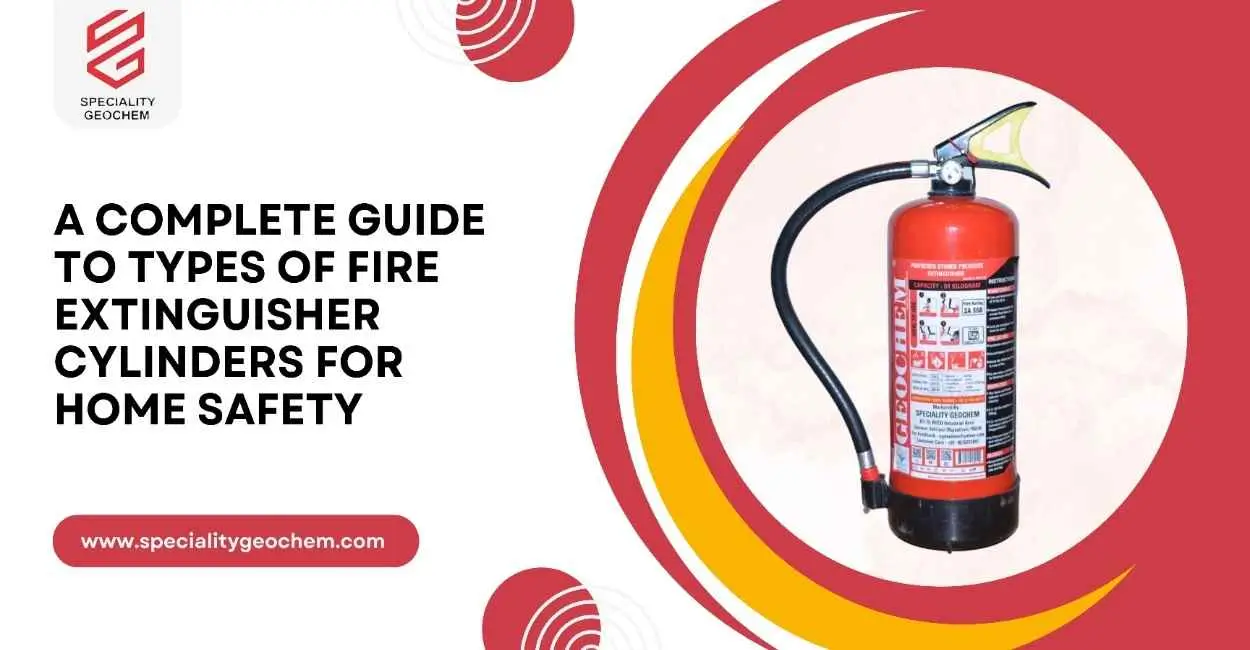Types of Fire Extinguisher Cylinders: Fire safety is one of the most important aspects of protecting your home and loved ones. While prevention is always the best approach, having the right firefighting equipment ready can save lives and property in an emergency. A fire extinguisher cylinder is one of the most vital safety devices, built in a compact form yet powerful enough to tackle and suppress small fires before they grow out of control.
In this guide, we will explore the different types of fire extinguisher cylinders, their applications, advantages, and tips for choosing the right one for your home.
Why understanding fire extinguisher types is important
Every fire is different. The material that is burning, the environment, and the source of ignition all determine which fire extinguisher is effective. Using the wrong type of extinguisher can be dangerous—for example, spraying water on an electrical fire can cause electrocution, and using a foam extinguisher on a metal fire might make it worse.
Understanding the types of fire extinguisher cylinders ensures you are prepared for the right fire risk in your home.
The main classes of fire and their relevance to extinguisher selection
Before learning about cylinder types, it’s important to know the classes of fire they are designed to combat:
- Class A: Fires that start from common combustible materials such as wood, paper, fabrics, and certain types of plastics.
- Class B: Fires caused by flammable liquids like petrol, diesel, oil, and paints.
- Class C: Fires fueled by flammable gases, including LPG, propane, methane, and similar combustible vapors.
- Class D: Fires caused by combustible metals such as magnesium, titanium, and sodium.
- Class E (Electrical Fires): Fires caused by faults or malfunctions in electrical equipment, wiring, or energized circuits.
- Class F (or K): Fires involving cooking oils and fats, common in kitchens.
Types of fire extinguisher cylinders
Below are the most common types of fire extinguisher cylinders used in homes and small commercial setups.
1. Water-based fire extinguisher cylinders
Best for Class A fires
These extinguishers release high-pressure water to lower the temperature of the flames and eliminate heat from the fire triangle, which consists of heat, fuel, and oxygen.
Advantages:
- Environmentally friendly.
- Cost-effective.
- Ideal for paper, wood, and fabric fires.
Limitations:
- Not suitable for electrical or flammable liquid fires.
- Can cause water damage to property.
2. Foam fire extinguisher cylinders
Best for Class A and B fires
Foam extinguishers create a protective layer over burning liquids, blocking the oxygen needed for combustion while simultaneously lowering the surface temperature.
Advantages:
- Effective for both solids and flammable liquids.
- Prevents re-ignition.
Limitations:
- Unsafe for tackling electrical fires unless manufactured and certified specifically for that application.
3. Carbon dioxide (CO₂) fire extinguisher cylinders
Best for Class B and Electrical fires
These extinguishers release CO₂ gas, which displaces oxygen around the fire and stops combustion.
Advantages:
- Leaves no residue—perfect for electronics and appliances.
- Effective for flammable liquid and electrical fires.
Limitations:
- Not suitable for Class A fires involving solids.
- Gas can be hazardous in confined spaces without ventilation.
4. Dry chemical powder (DCP) fire extinguisher cylinders
Effective for various fire categories, including Class A, B, C, and certain types of electrical fires.
These extinguishers release a fine powder that interrupts the chemical reaction in the fire.
Advantages:
- Versatile—covers most types of household fires.
- Works quickly and efficiently.
Limitations:
- Produces a fine powder residue that could potentially harm delicate or sensitive equipment.
5. Wet chemical fire extinguisher cylinders
Best for Class F fires
Wet chemical extinguishers are specially developed to combat kitchen fires resulting from burning cooking oils and fats. They cool the fire and form a soap-like layer to prevent re-ignition.
Advantages:
- Highly effective for deep-fat fryer and stove fires.
- Provides cooling and sealing effect.
Limitations:
- Limited use outside kitchen fire scenarios.
6. Clean agent fire extinguisher cylinders
Ideal for Class B, C, and Electrical fires
Also known as Halotron or FE-36 extinguishers, these use a clean, non-conductive gas that leaves no residue.
Advantages:
- Safe for electronics and sensitive equipment.
- No clean-up required after use.
Limitations:
- Typically more expensive than other types.
7. Fire ball extinguishers
Automatic and easy to use
These are spherical devices that can be thrown into a fire or mounted in risky areas. When in contact with flames, they automatically burst and release fire-extinguishing powder.
Advantages:
- No training required.
- Works even when unattended.
Limitations:
- Best used as a supplementary fire safety device, not a replacement for standard extinguishers.
How to choose the right fire extinguisher cylinder for your home
When selecting a fire extinguisher, consider:
- Potential fire risks: Kitchens require wet chemical or fire ball extinguishers; living areas may need water or foam types.
- Size and weight: Choose a size you can handle quickly in an emergency.
- Certifications: Look for ISI-certified products to ensure reliability.
- Ease of maintenance: Ensure the extinguisher has clear usage instructions and can be serviced regularly.
Safety tips for using fire extinguisher cylinders
- Follow the PASS technique: Pull the safety pin, Aim at the fire’s base, Squeeze the lever, and Sweep the nozzle from side to side.
- Place fire extinguishers in easy-to-reach areas such as kitchens, corridors, and close to exit points.
- Check the pressure gauge regularly.
- Replace or service expired extinguishers immediately.
Types of Fire Extinguisher Cylinders: Conclusion
Fire accidents can happen when you least expect them, but the right fire extinguisher cylinder can mean the difference between a minor incident and a devastating loss. By understanding the types of fire extinguisher cylinders and selecting the right one for your home’s specific needs, you are taking a major step towards ensuring safety.
Suppose you are looking for ISI-certified, high-quality fire extinguishers. In that case, Speciality Geochem offers a wide range of reliable and easy-to-use fire safety solutions for homes, offices, and industries. Protect what matters most—because in fire safety, every second counts.

